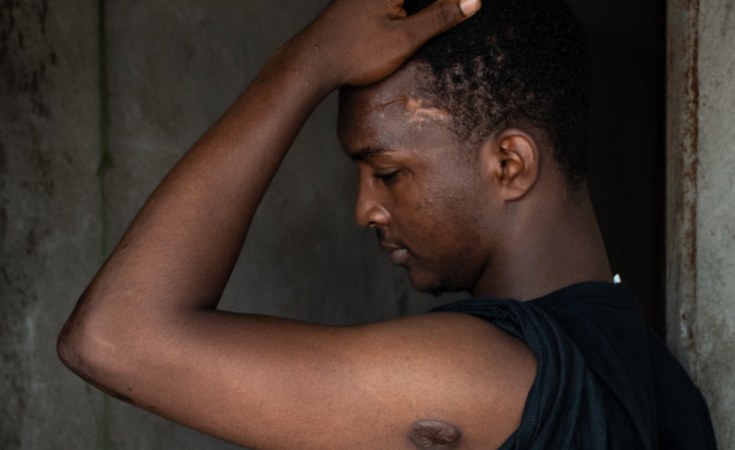Guinea's authorities have repeatedly violated the human rights to peaceful assembly and freedom of expression since 2019, said Amnesty International in a new report documenting a sustained crackdown on protest that has left more than a hundred dead and hundreds more seriously injured, including children, with insufficient access to adequate healthcare and deprived from justice and reparation.
The report "Wounded Youth: Care and justice urgently needed for the victims of unlawful use of force in Guinea" highlights ongoing obstacles to healthcare and justice faced by victims of unlawful use of force by defence and security forces in the context of demonstrations against the amendment of the Constitution under President Alpha Conde, and since the Comité National du Rassemblement pour le Développement (CRND) came to power in September 2021. Amnesty International previously documented repression between October 2019 and July 2020.
"Since 2019, at least 113 people have been killed and hundreds seriously injured by people identified as members of the defence and security forces during demonstrations. Despite the promises of the CRND to address excessive use of force under Alpha Conde including cases of killings, this extremely serious situation persists, in a general context of repression of dissenting voices," said Samira Daoud, Amnesty International's Regional Director for West and Central Africa.
Traumatized children and young people
Of the at least 47 people killed during protests under the CNRD as of 22 April 2024 according to an Amnesty International count, more than 75% were under the age of 25, and 40% were under the age of 18. A large proportion of the injured people interviewed for the report are also children and young people. Among them, Elhadj Bailo Diallo, 16, was hit by a teargas canister fired by people he has identified as members of the defence and security forces and lost sight in his right eye. Thierno Madiou Diallo,also 16, was wounded by a bullet and had to have his leg amputated. The youngest among the injured was a nine-year-old girl, who was hit by a stray bullet at her home.
After hitting me, they got out of the vehicle, kicked me twice, then got back into the vehicle and left.Mamadou Sadjo Baldé
The psychological trauma for those injured has caused many of them to drop out of school and left them unable to work, such as Souleymane Diallo, who was shot in 2024. "The pain continues and I can't stand up for long. I stay in bed watching my mother work to make ends meet," he said.
Victims prevented from accessing adequate healthcare
The report found that victims of serious injuries committed by the defence and security forces during demonstrations received delayed medical treatment, after the latter prevented or delayed medical evacuation, in violation of Guinean and international law. According to testimonies collected by Amnesty International, law enforcement agencies knowingly left victims with serious injuries at the scene instead of providing assistance. Victims were also arrested and detained without medical care, sometimes for several days.
Mamadou Sadjo Baldé was seriously injured during a demonstration after being hit by a vehicle driven by people he identified as members of the defence and security forces. "After hitting me, they got out of the vehicle, kicked me twice, then got back into the vehicle and left," he said to Amnesty International.
According to several testimonies, some medical staff of public and private health centres refused to treat the injured people for fear of reprisals from the authorities, who have constantly sought to play down the repression.
Finally, while the authorities must guarantee the principle of affordability in order to protect the right to health, in the absence of any compensation for injured persons, many people coming from modest backgrounds have been unable to afford adequate healthcare, often with dramatic consequences. One of them, Alpha Oumar Diallo, who became a paraplegic after being shot during a demonstration in 2019, died in September 2023, having been unable to pay for adequate care.
The Guinean authorities must strictly uphold the principles of international law on the use of force and firearms by law enforcement officials.Samira Daoud, Amnesty International's Regional Director for West and Central Africa
Impunity for perpetrators
Since 2019, there have been few convictions of members of the defence and security forces for unlawful use of force. Several legal proceedings have been announced or actually initiated by the CNRD but little public information is available on their development, and they mainly concern cases of killings. Those who survived are generally deprived from accessing justice and reparation.
The injured and the families of the victims have largely given up filing complaints, due to their lack of confidence in the justice system, fear of reprisals or lack the financial means.
To date, assemblies have been unlawfully banned, defence and security forces have continued to be deployed with lethal weapons, and deaths and injuries as a result of unlawful use of force continue to be documented by civil society organizations and the media.
"The Guinean authorities must guarantee the rights to freedom of expression and peaceful assembly, strictly uphold the principles of international law on the use of force and firearms by law enforcement officials and ensure that any person injured during demonstrations is promptly taken care of by medical services, without condition of payment of medical expenses in advance," said Samira Daoud.


